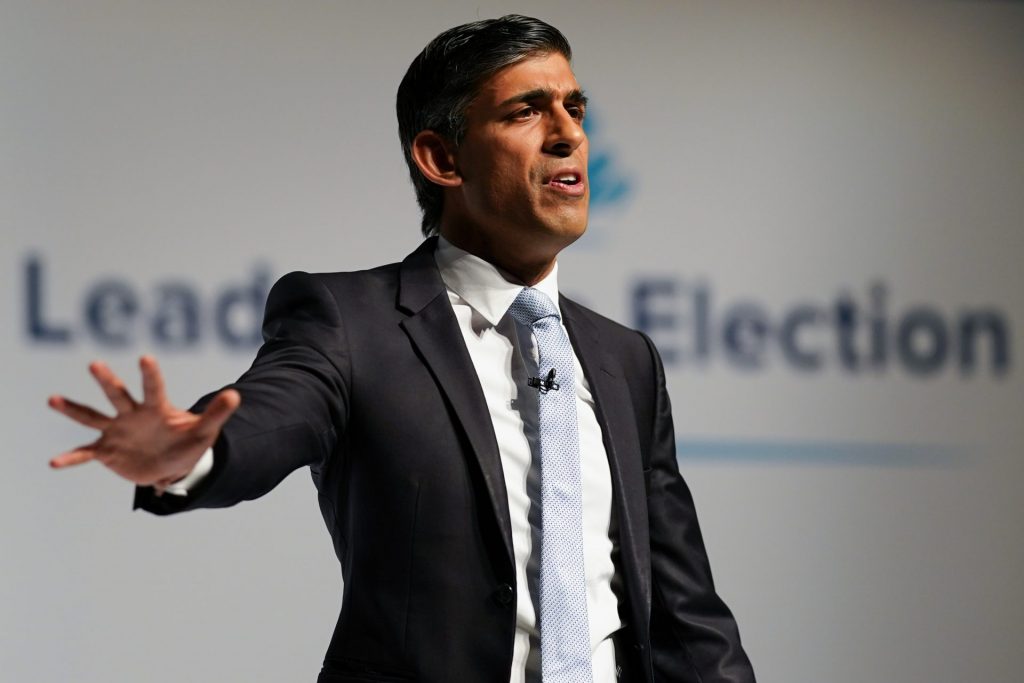“If only”: thus read the dejected reply of a senior minister when I asked last week whether Rishi Sunak’s cancellation of his meeting with the Greek prime minister had all been part of a cunning plan. Surely there was method in the madness? Not a bit of it.
To recap: in an interview on Sunday November 26, the BBC’s Laura Kuenssberg asked Kyriakos Mitsotakis whether the Parthenon Sculptures, also known as the Elgin Marbles, would look better in Athens or London. The Greek PM politely restated what has been his nation’s official position since 1983: that the magnificent artefacts, the work of the sculptor Phidias in the 5th Century BC, taken from the temple of Athena on the Acropolis in Athens and presently on display at the British Museum, should be returned to their original home.
“It’s as if I told you that you would cut the Mona Lisa in half,” he said, “and you would have half of it at the Louvre and half of it at the British Museum. Do you think your viewers would appreciate the beauty of the painting in such a way?”
Sunak had been due to meet Mitsotakis on Tuesday November 28. But the day before, No 10 called off the engagement, bringing fresh meaning to the words “cancel culture”. Offered a wooden spoon meeting with Oliver Dowden, the deputy prime minister, Mitsotakis (not surprisingly) declined.
Instead, after amiable talks last Monday with Sir Keir Starmer, he cut short his trip, declaring “my annoyance that the British prime minister cancelled our planned meeting just hours before it was due to take place. Anyone who believes in the rightness and justice of his positions is never afraid of confronting arguments”. Well, quite.
Thus had a perfectly routine intergovernmental visit become a full-blown, Olympic-class diplomatic row. In search of a rationale for Sunak’s juvenile behaviour, some in Westminster speculated that he had, in fact, confected a confrontation with Greece to drive the multiple tribulations of the home secretary, James Cleverly, from the headlines.
Certainly, Cleverly was having a bad time of it. Exasperated by the Supreme Court’s rejection of the government’s Rwanda scheme, he had told the Times that the plan was not the “be all and end all” of government policy.
Separately, he was dealing with anger from the right over the latest estimates of migration, which, according to the Office for National Statistics, reached a record 745,000 in the year to December 2022. He also had to apologise in the Commons for using “inappropriate language” to describe Alex Cunningham, Labour MP for Stockton North – though many MPs are still sure that Cleverly was referring to the town rather than the person when he used the word “shithole”.
“It was,” in the words of one of his backbench colleagues, “a clusterfuck in need of a dead cat”. This refers to the political technique, charmingly described by Tory strategist Sir Lynton Crosby, of slamming a metaphorical feline corpse on the table – anything will do – to distract attention from another, more substantial controversy.
Easy as it is to see why MPs and journalists might look for a tactical explanation for Sunak’s fit of pique, sometimes a tantrum is just a tantrum. The PM, I am told, was privately as well as publicly “furious” that Mitsotakis had reiterated Greece’s claim to the sculptures, after assuring No 10 in advance that he would not do so.
The Greek government denies making any such undertaking. And what, in any case, was Mitsotakis to do when asked about the marbles by Kuenssberg? Claim that the matter was too sensitive to discuss on live television? Pretend to faint?
Nor, for that matter, was anything the Greek prime minister said remotely new or surprising. The question of the sculptures’ proper home has been a matter of controversy since before parliament decided in 1816 that they should be bought for the nation from Lord Elgin, the former ambassador to the Ottoman empire.
In the parliamentary debate preceding that decision, Hugh Hammersley, MP for Helston, asked why the marbles could not be held in trust until such time as “they are demanded by the present, or any future, possessors of the city of Athens?” His suggestion was scorned, but the case for the sculptures’ return to Greece has been made continuously and with varying degrees of intensity ever since.
In 1941, Clement Attlee, who was deputy PM at the time, tersely turned down such a proposal. Twenty years later, Harold Macmillan did the same with characteristic moderation. “This is a complicated question which can hardly be dealt with without a great deal of consideration,” he told the Commons. “There is a problem here. I will not dismiss it from my mind”.
The case for reunification of the Parthenon Sculptures in Athens was also taken up by Colin MacInnes, the author of Absolute Beginners, who wrote in 1963 that, “I have such an irrational faith in the ultimate decency of my fellow countrymen, that I cannot believe them for ever incapable of doing the right, apt thing.”
In 1987, the journalist Christopher Hitchens published a book making a similar plea. Melina Mercouri, the Greek film star and culture minister between 1981 and 1989 and again from 1993 until her death the following year, campaigned tirelessly for the return of the sculptures.
There was nothing, in other words, that Mitsotakis could possibly have put to Sunak that should have taken him by surprise. As the head of a government presently dealing with a cost-of-living crisis, record NHS waiting lists, criticism of its net zero backsliding at the Cop28 summit in Dubai, and conflicts in Ukraine and the Middle East, the PM really ought to have been able to muster a polite response to the familiar question: “Can we have our marbles back, please?”
Instead, finding himself in a political hole of his own digging, he decided to keep hard at it with his trusty shovel of cringe. At PMQs last Wednesday, Starmer had great sport with Sunak, asking why, in dealing with “a fellow Nato member, an economic ally and one of our most important partners in tackling illegal immigration” he had resorted to “such small politics”.
As if to prove the Labour leader’s point, the PM claimed that Mitsotakis had intended “to grandstand and relitigate issues of the past”. Scarcely able to believe his luck, Starmer replied that, in his own meeting, he had “discussed the economy, security and immigration with the Greek prime minister. I also told him we would not change the law regarding the marbles – it is not that difficult”.
In effect, the Labour leader now looked like the PM-in-waiting, power draining palpably from one side of the dispatch box to the other. Instead of reasserting his authority and dignity, Sunak flailed desperately with an ill-focused attempt to ignite a culture war.
Starmer, the PM said, had been asked which song best reflected his party’s values. “What did he come up with? He showed his true colours and chose Ode to Joy – literally the anthem of the European Union. He will back Brussels over Britain every single time.”
There are indeed monuments, statues and works of art about which the British feel strongly and which they would not want to leave these shores. But, as poll after poll has shown, the Parthenon Sculptures are not among them.

In pretending otherwise, and throwing a hissy fit, Sunak had shown himself to be not a Churchillian defender of the nation but a complete fool. When King Charles wore a tie emblazoned with the Greek flag in Dubai last Friday, he was engaging in royal semiotics of the most mischievous and effective kind. Our uncodified constitution prevents the monarch from calling his prime minister a prat. But this was the next best thing.
As George Osborne, the chair of the British Museum, pointed out last week, the sculptures are not, in any case, in the gift of the government. Only a fortnight before Sunak’s foot-stamping outburst, the former chancellor had floated the idea of lending them to the Acropolis Museum, which was opened in 2009 – a civilised, face-saving arrangement that would reunite most of the original Parthenon Frieze without raising the political temperature.
When John Keats beheld the sculptures in 1817, he wrote in a sonnet of the “browless idiotism” with which other men had treated them. Two centuries later, that angry poetic phrase feels embarrassingly appropriate once more.
Since he became prime minister, Sunak has often seemed tetchy and ill-equipped for the most basic criticisms that come with the job. In this particular fiasco, he has further revealed quite how brittle and easily threatened he is. Which, in turn, seems bleakly emblematic of a nation that, far from asserting itself since Brexit, is suffering an unforced crisis of confidence.
In his great text-book Diplomacy, Henry Kissinger, who died last Wednesday, reflected on the British tendency towards “splendid isolation” – and how it only worked in tandem with “the traditional methods of European diplomacy”. It is precisely these methods that Sunak so foolishly ignored.
Kissinger also knew how high the stakes had become in the 2020s. In his final book, Leadership, published last year, he wrote: “The grave conditions described here must, in the end, provide the impetus for societies to insist on meaningful leadership.”
Again, “meaningful leadership” is precisely what Sunak cannot provide; conspicuously so. This absurd, tragicomic episode has told us more than any slogan, speech or policy about the fundamental weakness of his premiership. Billed as the grown-up who was going to restore adult government, he turns out to be the most peevish toddler of the lot.




